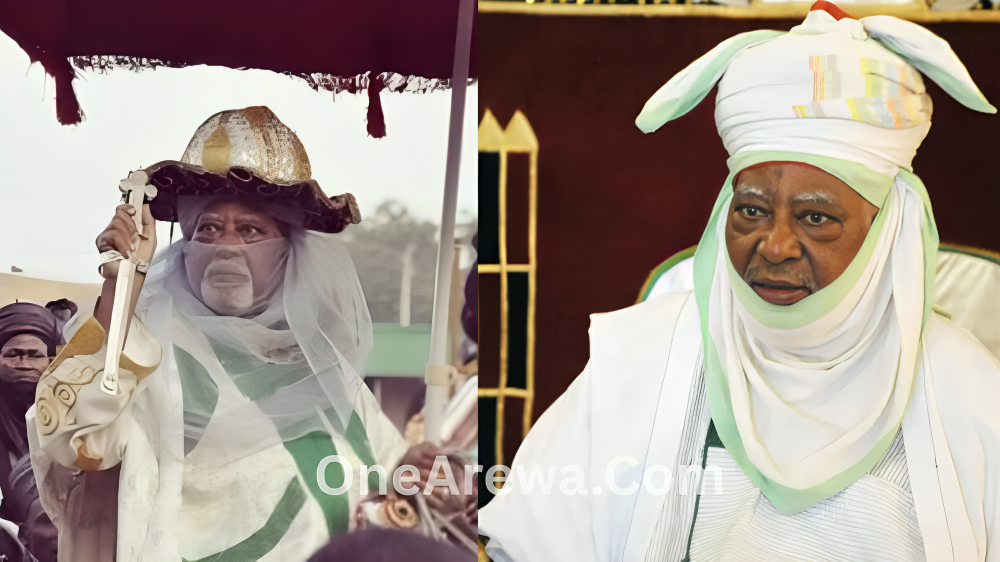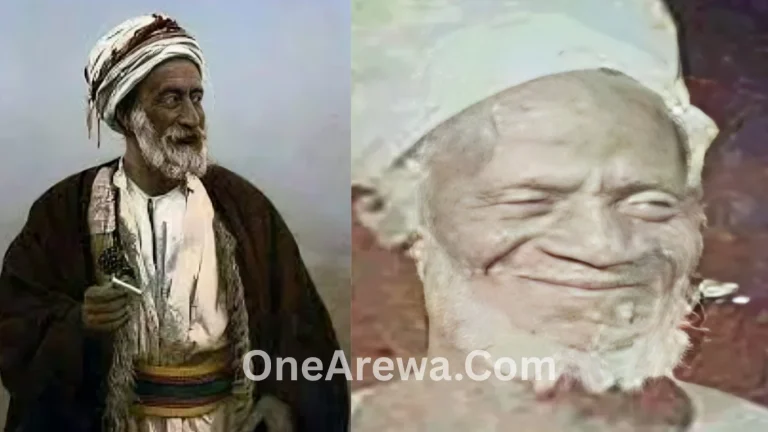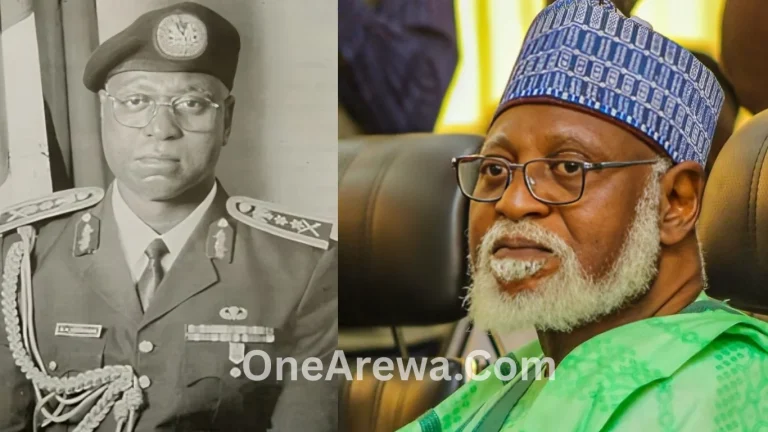Ado Bayero: The Legendary Emir Who Transformed Kano’s History
Ado Bayero: The Legendary Emir Who Transformed Kano’s History
Alhaji Ado Abdullahi Bayero was born on 25 July 1930 in Kano, Nigeria, and reigned as the Emir of Kano from October 1963 until his death on 6 June 2014, making him one of the longest-serving and most influential emirs in Nigerian history.
A member of the Fulani Sullubawa dynasty, he was the son of Emir Abdullahi Bayero and received both Islamic and Western education, attending Shuhuci Islamic School and later the School for Arabic Studies, Kano.
Before becoming emir, he served as a clerk, a member of the Northern House of Assembly, and was appointed Nigeria’s ambassador to Senegal in 1957.
His ascension to the throne in 1963 marked the beginning of a transformative era in the Kano Emirate, during which he promoted religious tolerance, expanded educational opportunities, preserved Hausa-Fulani cultural heritage, and provided counsel to national leaders during periods of unrest.
Despite surviving an assassination attempt in January 2013, Ado Bayero remained a symbol of peace and resilience until his passing on 6 June 2014.
He was buried at the Gidan Nasarawa royal cemetery, and his legacy continues through institutions like the Ado Bayero Mall and his successor, Aminu Ado Bayero, who became emir in 2020.
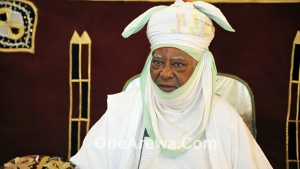
Ado Bayero Wiki Profile
| Fact | Details |
|---|---|
| Full Name | Alhaji Dr. Ado Abdullahi Bayero |
| Title | 13th Fulani Emir of Kano |
| Date of Birth | 25 July 1930 |
| Place of Birth | Kano City, Kano State, Nigeria |
| Father | Emir Abdullahi Bayero (ruled 1926–1953) |
| Education | Islamic School (Shuhuci), School for Arabic Studies (SAS), Kano |
| Early Career | Clerk, Kano Native Authority; Legislator; Nigerian Ambassador to Senegal |
| Date of Ascension as Emir | October 1963 |
| Years on the Throne | Over 50 years (1963–2014) |
| Religious Affiliation | Islam (Sunni) |
| Known For | Peacebuilding, Modernization, Cultural Preservation, Education Advocacy |
| Assassination Attempt | Survived a terrorist attack on 19 January 2013 |
| Date of Death | 6 June 2014 |
| Age at Death | 83 years |
| Burial Place | Gidan Nasarawa Royal Cemetery, Kano |
| Successor | His son, Aminu Ado Bayero (Emir of Kano, 2020–present) |
| Legacy Landmarks | Ado Bayero Mall, Schools, Mosques, and Roads named in his honor |
| Key Traits | Humble, Wise, Tolerant, Peaceful, Visionary |
| Wives and Children | Multiple wives; several children, including Emirs Aminu and Nasiru |
| Legacy | One of the most respected traditional rulers in Africa |
Check Out: Queen Sarraounia Mangou: The African Warrior Queen Who Defeated the French

Ado Bayero’s Early Life and Background
Alhaji Ado Abdullahi Bayero was born on 25 July 1930 in Kano City, into the prestigious Fulani Sullubawa clan of the Kano Emirate royal family.
He was the son of Abdullahi Bayero, the Emir of Kano from 1926 to 1953, and a respected Islamic scholar and leader.
Ado Bayero’s early life was deeply rooted in Islamic tradition, but his father also ensured he received a modern education, a rare combination for royalty at the time.
He began his education at the traditional Shuhuci Islamic School, where he studied the Qur’an, Hadith, and Islamic jurisprudence.
Recognizing the importance of Western knowledge in a changing Nigeria, he later enrolled in the School for Arabic Studies (SAS) in Kano, one of the premier institutions in Northern Nigeria during the colonial era.
His exposure to both Islamic and secular knowledge would later become a hallmark of his balanced and visionary leadership.
As a young prince, Ado Bayero was known for his humility, intelligence, and calm demeanor.
He grew up during a period of political transition as Nigeria moved from colonial rule to independence, which helped shape his deep understanding of both traditional authority and modern governance.
These early foundations prepared him for a life of public service and ultimately his historic reign as the Emir of Kano.
Ado Bayero Early Career Before Emirship
Before ascending the throne, Ado Bayero was actively involved in public service, diplomacy, and traditional leadership, laying the groundwork for his future as one of Nigeria’s most revered emirs.
After completing his education at the School for Arabic Studies (SAS), Kano, he joined the Kano Native Authority in the early 1950s, where he worked as a clerical officer.
His dedication and sense of duty quickly earned him recognition within the administrative circles of Northern Nigeria.
In 1954, Ado Bayero was elected as a member of the Northern House of Assembly, representing Kano.
His involvement in politics during this pre-independence period provided him with firsthand experience in legislative processes and governance, a rare advantage for a traditional prince at the time.
In 1957, he was appointed as Nigeria’s Ambassador to Senegal, a prestigious diplomatic position that he held with distinction.
While in Dakar, Ado Bayero gained valuable international exposure, interacting with leaders and diplomats from across West Africa.
His time abroad not only broadened his worldview but also deepened his appreciation for the value of peaceful diplomacy, which would later influence his leadership style as emir.
Upon returning to Nigeria, he briefly served as the Head of the Kano Native Authority Police Force, further solidifying his experience in governance, public order, and conflict resolution.
This combination of administrative, legislative, and diplomatic experience uniquely prepared him for the responsibilities he would inherit as Emir of Kano in October 1963, following the death of Emir Muhammadu Inuwa.
Ado Bayero Becoming the Emir of Kano
Ado Bayero ascended the throne as the Emir of Kano in October 1963, following the sudden death of his predecessor, Emir Muhammadu Inuwa, who had ruled for only three months.
At the time of his appointment, Ado Bayero was just 33 years old, but his royal lineage, extensive experience in governance, and commendable character made him the ideal candidate to lead the historic Kano Emirate.
His selection as emir came during a critical period in Nigeria’s post-independence history, marked by political instability, ethnic tensions, and a nation struggling to define its identity.
Despite the pressure, Ado Bayero accepted the mantle of leadership with grace, humility, and a vision for transformation.
Upon his installation, he became the 13th Fulani Emir of Kano in the lineage that began after the Usman ɗan Fodio-led Jihad of the 19th century.
As emir, he inherited the responsibility of upholding Islamic traditions while navigating the rapidly changing political and social landscape of Nigeria.
From the outset, Ado Bayero proved to be a unifying force, respected not only within Kano but also across Nigeria and beyond.
He worked to strengthen the emirate’s traditional institutions while promoting peace, education, and cultural preservation.
His leadership style was marked by wisdom, moderation, and deep empathy, earning him the loyalty of his subjects and the admiration of political leaders from all regions and religions.
Ado Bayero’s reign, which lasted for over five decades, became a golden era for the Kano Emirate, defined by stability, progress, and deep respect for tradition, even in the face of modernization and national upheavals.
Check Out: Maryam Babangida: The Iconic First Lady Who Transformed Women’s Roles in Nigeria
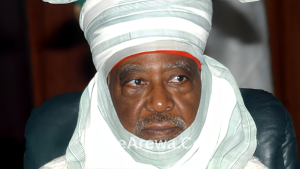
Ado Bayero Reign and Achievements
Alhaji Ado Bayero ruled the Kano Emirate from October 1963 until his death on 6 June 2014, making him one of the longest-reigning traditional rulers in Nigerian history.
His more than 50-year reign was marked by peace-building, modernization, cultural preservation, and spiritual leadership.
He became a symbol of unity and continuity, leading his people through decades of political transitions, economic challenges, and social transformations.
1. Promoter of Religious Tolerance and Peace
Ado Bayero was known for his deep Islamic faith and commitment to religious harmony.
In a region often troubled by religious and ethnic tensions, he emerged as a calming voice, encouraging peaceful coexistence among Muslims, Christians, and traditionalists.
Even in times of crisis, such as during the Sharia debates, religious riots, and terrorist insurgencies, he consistently advocated for non-violence and dialogue.
His moral authority made him a respected voice in interfaith peacebuilding across Nigeria.
2. Advocate of Education
A visionary leader, Ado Bayero championed both Islamic and Western education.
He promoted the establishment of Islamic schools, public schools, and tertiary institutions in Kano.
He was particularly passionate about girls’ education, challenging cultural resistance, and encouraging families to send their daughters to school.
Under his reign, educational development in Northern Nigeria expanded significantly, laying the foundation for future generations.
3. Modernization of the Kano Emirate
While deeply rooted in tradition, Ado Bayero embraced modern administrative practices.
He worked with successive governments to implement development programs in health, education, infrastructure, and social welfare.
He encouraged the youth to acquire modern skills, supported technological growth, and opened the emirate to economic partnerships.
Despite Nigeria’s rapid urbanization, he managed to modernize Kano without compromising its rich cultural heritage.
4. Preserving Hausa-Fulani Culture and Tradition
As Emir, Ado Bayero was the custodian of the Hausa-Fulani cultural identity.
He supported cultural festivals such as Durbar, maintained royal customs, and upheld Islamic moral codes.
He also made efforts to document and preserve oral histories, traditional architecture, and the institutional structure of the emirate system, ensuring that the legacy of Kano’s past remained vibrant.
5. National Statesman and Mediator
Beyond Kano, Ado Bayero became a father figure to Nigeria. Presidents, governors, religious leaders, and foreign diplomats often sought his advice and blessings.
He was known for his non-partisan stance, and he frequently acted as a mediator during political tensions, helping to stabilize national issues.
His diplomatic style and moral credibility earned him widespread reverence.
6. Survivor of Assassination Attempt
In January 2013, Ado Bayero survived a deadly assassination attempt in Kano by suspected extremists. His convoy was attacked, leading to the deaths of several aides and injuries to others.
Though wounded, he survived the incident and was flown abroad for treatment.
This attack only strengthened his status as a symbol of resistance against terrorism and extremism in Northern Nigeria.
7. Legacy Projects and Recognition
During and after his reign, numerous landmarks were named in his honor, including the Ado Bayero Mall, the largest shopping center in Northern Nigeria, and several mosques, schools, and roads. His leadership style became a model for traditional rulers across West Africa.
In recognition of his contribution to peace and development, he received national honors, international awards, and honorary degrees from various universities.
In summary, Ado Bayero’s reign was defined by wisdom, reform, courage, and compassion.
He stood at the intersection of tradition and transformation, guiding the Kano Emirate through one of the most important chapters in Nigerian history, leaving behind a timeless legacy as the emir who preserved the past while building the future.
Check Out: Hajiya Bilkisu Yusuf: Nigeria’s First Female Newspaper Editor and Feminist Icon
Ado Bayero Assassination Attempt
On 19 January 2013, Alhaji Ado Bayero, the revered Emir of Kano, narrowly escaped death in a brazen assassination attempt that shocked Nigeria and the international community.
The emir, who was returning from a Qur’anic graduation ceremony in Kano, was ambushed by heavily gunmen who opened fire on his convoy near Hausawa quarters in the ancient city.
The coordinated attack left at least four people dead, including two of his bodyguards and his driver. Several others were injured, including two of his sons, who were in the vehicle with him.
The Emir himself sustained injuries to his arm and face due to shattered glass when bullets struck his vehicle.
He was quickly airlifted to the United Kingdom for medical treatment, where he recovered after weeks of close observation.
The incident was widely believed to have been carried out by extremist elements, possibly linked to Boko Haram, who had at the time intensified attacks on traditional leaders, Islamic scholars, and institutions perceived to oppose their ideology.
The attempted assassination marked a turning point in the public perception of the extremist threat, demonstrating that no one, not even the most respected spiritual leaders, was immune to the growing wave of violence.
Despite this life-threatening attack, Ado Bayero returned to Nigeria to a hero’s welcome, greeted by thousands of supporters in a display of solidarity and loyalty.
Rather than respond with fear or revenge, the Emir preached peace, resilience, and forgiveness, reinforcing his role as a moral leader and symbol of stability in Northern Nigeria.
This event solidified his legacy as a fearless and unshakable leader, one who stood firm in the face of terror and continued to serve his people with grace, wisdom, and courage until his passing in June 2014.
